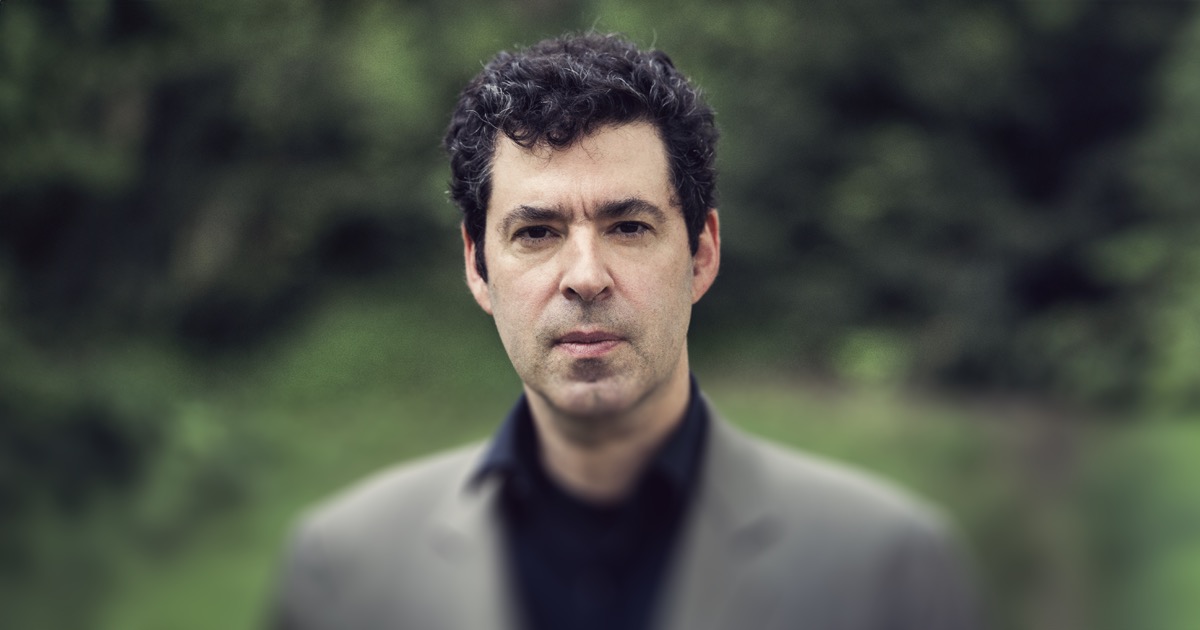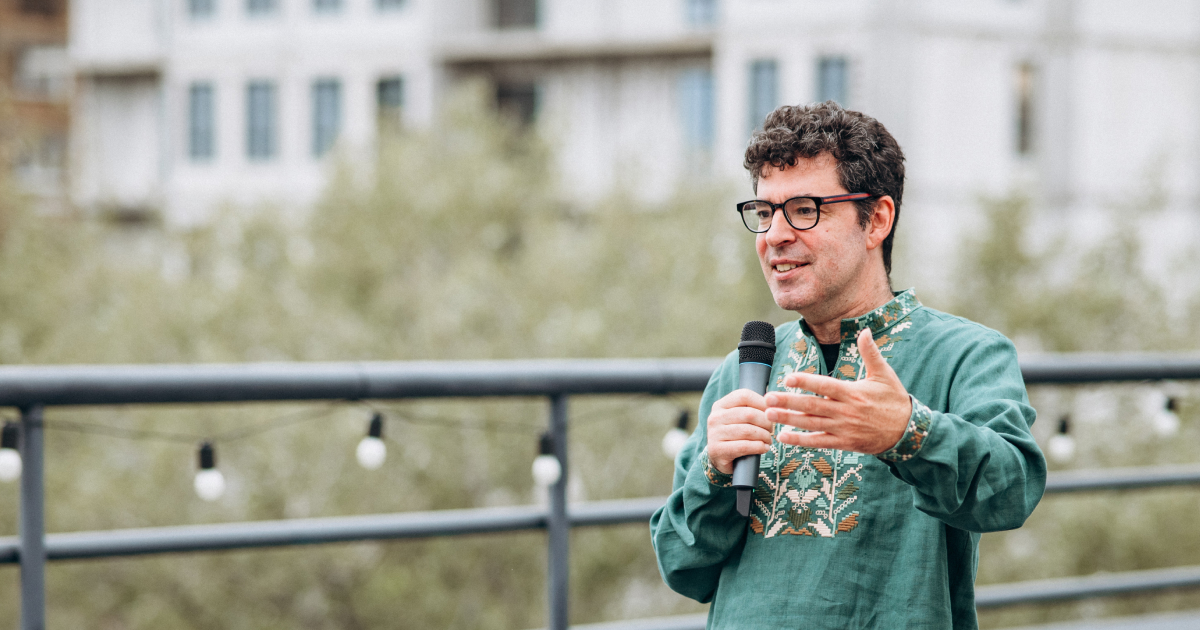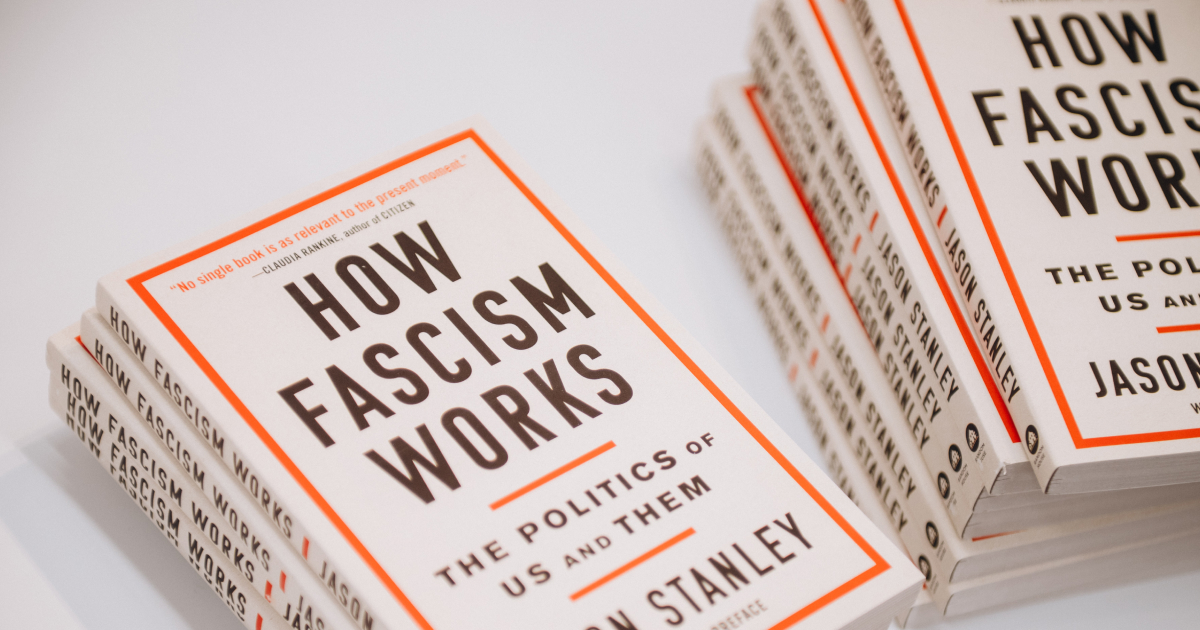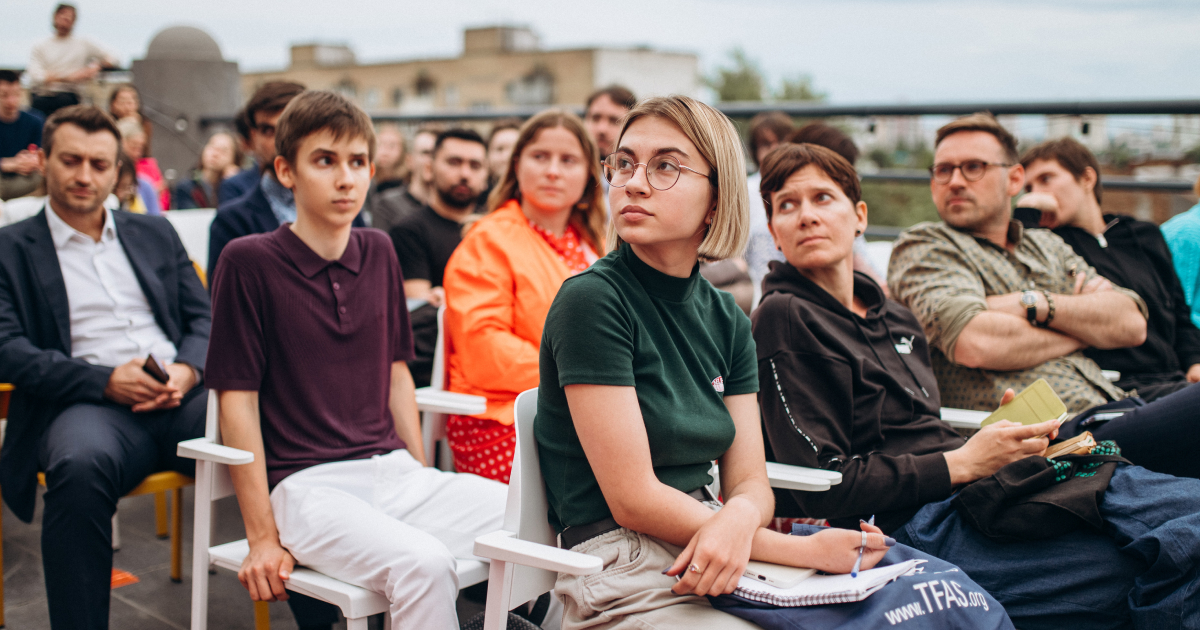Nationalism and acceptance of the Soviet past: the way of decolonization for Ukraine. Interview with Yale professor, Jason Stanley

Jason Stanley is a professor at Yale University, the author of the books «How fascism works?» and «How propaganda works?». He came to Ukraine for the first time after a 6-year break to teach at the Colonialism and Fascism summer school. An American philosopher and scholar of propaganda who is the child of refugees of World War II Europe, has a profound understanding of how democratic societies can be susceptible to fascism. He believes that the Ukrainian form of nationalism is closely tied to genuine democracy and that the Russian-Ukrainian war is anti-colonial.
Svidomi talked to him about contemporary fascism in the world, Ukraine's colonial past, democracy, and healthy nationalism. Additionally, why we should not equate the Soviet Union and Russia in the current war and what are the decolonization steps to implement right now.
What is the definition of contemporary fascism?
— Fascism takes the dominant national group, their language, their traditions, and in the case of Germany [during World War II] their blood. Fascists consider that they deserve to rule over others. Human life doesn't matter. They say the enemy is everyone who is not for the dominant group. National minorities are going to take over, and so the national minorities have to take a threat. Fascism is anti-feminist , because feminism is a communist plot, according to them. Fascism is harshly anti-LGBT.
Can fascism appear in a democratic society?
— Every democratic society has a fascist movement, and democracy is a fight against that fascist movement. Name me a democratic society that doesn't have a fascist movement? All classical fascist regimes came to power in democratic elections.
[In his book “How fascism works, Stanley emphasizes the fascist policy of Donald Trump and his party, and explains how did this policy work. He wrote that America was in fascism's phasе, which posed a threat to democracy. In his text for the Guardian, Stanley mentions such authoritarian leaders as Jair Bolsonaro in Brazil, Viktor Orban in Hungary, and Vladimir Putin in Russia, who came to power through elections but pursue policies that could be called fascist. In particular, restrictions on women's freedom, pressure on national and sexual minorities, and control over abortion and birth rates].

How to recognize fascists?
— They're the ones who say that immigrants are bad, LGBT is bad, and the national minorities must be subservient to the dominant group. Women should be at home, you've got to have lots of babies to replenish the race or the people, and you need violence. The military is the most important institution in fascist societies.
There's the old right and there's the new right. The old right is the social conservatives, the religious people, and the new right is the fascists. The new right are the people who say to the religious people: we're going to make sure that there's no LGBT, women don't have rights, it's a macho society. We're going to make sure you're protected from liberalism. Thus, the old right votes for the fascists, since they see it as preferable to democracy.
Is Russia a fascist state? Why\why not?
— We see violent militias, fascist regimes, and authorities send their opponents to prison. They put their national minorities, or Russia considers Ukrainians national minorities, in concentration camps, which is happening right now in occupied areas of Ukraine.
There are 18 new prison camps, where torture is used. So, they put national minorities in prison and torture. They're ruled by a dictator who claims that he's the representative of the national minority.I don't know how anyone could deny that Russia is the most clearly fascist country since Nazi Germany existed.

You said a lot about colonialism in terms of European colonization. Is it possible to apply the classical theory of colonialism to Ukraine, and has Ukraine ever been a colony?
— I think there are a lot of overlaps. There are a lot of colonialist practices that you've been subject to. In my opinion, it's still complicated with the Soviet Union, because the Soviet people attacked not only Ukrainian churches and not only Ukrainian religion but everybody.
For sure, there were colonialist elements in the Soviet Union. For instance, Moscow was the center. All the intellectuals went to Moscow. Yes, that's colonialism. Also, there's the suppression of the Ukrainian language. But with the Soviet Union, they oppressed all identities except the worker one.
I think Russia is trying to subject Ukraine right now to something like African colonialism, where they're extinguishing the culture, putting Ukrainians in concentration camps, and mass slaughtering them. They are going to extinguish Ukrainian identity, and history, and make them Russian. I don't think in the early parts of the Soviet Union it was Russian nationalism. Right now, it's just Russian nationalism. I think Ukraine has experienced colonialism its entire history in some form or another.
So, Ukraine was a colony?
— Ukraine was certainly a colony before the Soviet Union. During the Soviet Union, the Ukrainians experienced genocide under the early Soviet Union with Holodomor or Gulags. Ukraine has certainly experienced for centuries the attempt to stamp out its culture and language – the things that colonies experience. And right now, you have a fascist imperialist empire, which has more resources, that is trying to crush and conquer Ukraine. Which is pretty much the basic definition of colonialism. Moreover, they're attempting to make you a colony now.
During WWII there were units fought with the Red Army in particular in Western Ukraine?
— I wouldn't brag about being allied with Hitler. Never do that. Never do that at this moment. Because of what Putin is saying. It is walking right into Russian propaganda. Never, ever say that the Nazis were better than Stalin. I know a lot of people seem to.
[Historian and writer Olesya Khromenchuk in her research article about Ukrainians in the German Army says: “Ukrainians who fought on the German side can be separated into two main categories: those who were recruited under duress (mostly former Red Army soldiers who were taken prisoner by the Germans, usually from territories of Reichskommissariat Ukraine, formerly under Soviet rule) and those who joined voluntarily (Ukrainian nationalists, mainly from the lands of the General government which until 1939 were part of Poland).
The early phase of the formation of the Ukrainian units that fought on the German side is strongly linked to the question of nationalism and aspirations of state-building. The legacy of the state-building attempts of the early twentieth century, when the lands populated by Ukrainians were part of the Romanov and the Habsburg empires, is thus crucial for our understanding of the events that unfolded during the Second World War”.
For independence, Ukrainian forces had to fight against the Red Army in the east by using the military resources of the German Wehrmacht. When the leader of OUN (Organization of Ukrainian nationalist) - Stepan Bandera proclaimed the independence of the Ukraine state, in 1941 Nazi didn’t support it and imprisoned him in a concentration camp until 1944. Thus, Ukrainians had been fighting on two fronts: against the USSR and Germany. So, neither the Germans nor the Soviets were interested in building a Ukrainian state. The Reich Commissioner of Ukraine in 1942-1944, Eric Koch, in his inaugural speech, noted that the Nazis' task is to suck from Ukraine all the goods they can get hold of, without consideration of the feelings or property of the Ukrainians].

How else should we reflect on our Soviet past in our struggle today?
— Everyone wants to talk about how bad the Soviet Union is. It definitely is. But now you're facing Putin. You're not facing the Soviet Union. The Soviet Union does not exist. It isn't the same. Putin is a Nazi. He's a fascist. He wants to commit genocide against you. He wants to put you in concentration camps. The Soviet Union was murderous and totalitarian. But it was a different murderous and totalitarian from what you face now. The Soviet Union didn't openly say — we're going to kill all the Ukrainians.
But they did, they killed Ukrainians.
— They killed a lot of Ukrainians, and then they said it was an administrative error. Putin says he's going to kill all the Ukrainians. Do you know what killing all the Ukrainians looks like? It looks like Babyn Yar where Nazi killed 33 771 people in two days [On September 29-30, 1941, mass executions took place in Babyn Yar in Kyiv, killing 33,771 people. According to historians, over 100,000 people died there during the two years of Nazi occupation of Kyiv. Half of them were Jews.] That's what the Russians do. They killed 48,000 people in Aleppo, Syria. That's what you face.
[During Holodomor – an artificial feminine created by Soviet dictator Stalin – 3.9 million Ukrainians died. 1937-1938 – The Great Purge or the Great Terror campaign of political repression in the Soviet Union was held. It has been estimated that between 200,000 to 600,000 people died at the hands of the Soviet government during the Purge. According to NKVD regulations certain national and social groups, in particular, the Ukrainians had to be eliminated]
You mentioned nationalism as a main tool for decolonization. What form of nationalism should the Ukrainians choose?
— Firstly, don't choose the kind of nationalism that oppresses national minorities. Ukraine is more democratic than the countries to its west. You do have Pride. Ukraine is one of the most democratic countries in the world (according to the democracy index – Ukraine is ranked 87 place). So the nationalism you choose must be the kind of nationalism that says – we are Democrats. It says that immigrants are welcome. Human rights are important as well. It can't be the kind of nationalism that results in beating up or killing people who are not Christian, for example.
It has to be a nationalism that looks back on Ukrainian bad things in Ukrainian history. You have to acknowledge your mistakes and not very good pages of history. When we are speaking about Germans – they lost the war, and they're embarrassed by their past. They're not embarrassed by Goethe and Schiller or Beethoven, but they're embarrassed by the Nazis. A good nationalism is like: "Let's do better. Let's not forget our history. There are good parts of our history. There are bad parts of our history. Our country is right now in a freedom struggle". What are you doing now is a great part of your history, I guess.
For instance, I'm an American nationalist. I'm very proud to be an American. But I'm critical of my country at the same time. We had the Civil Rights Movement. Everywhere you go in the world, there's hip-hop and rap. I'm very proud of those things. But I'm also ashamed of slavery, racism, the Iraq War, the Vietnam War. We've killed millions of people for no reason at all. Healthy nationalism confronts its past and doesn't hide history. It talks about healthy nationalism in schools. It concentrates on the history of the country. That's what makes it nationalism. You shouldn’t teach only good things about your history, because it is a kind of bad nationalism. You have to do both.
Some consider Ukraine to be the primary force driving decolonization in Eastern Europe. After the full-scale invasion, many former Russian colonies began to acknowledge their colonization past. How can we help other nations in their pursuit of decolonization and the dissolution of the Russian Empire?
— They should be your allies. I also think that Russia is a white settler colonial state. The ethnic minorities are being used as cannon fodder in the war. I think you guys have an opportunity there. It's not just an opportunity. I think it's a moral duty.
Who do you think might be the agent of imperial disintegration in Russia, given that even the so-called Russian liberals have an imperial mindset? If it is actually possible: to have Russia eliminated as an Empire?
— That's for the Russians to decide. Just like it's for Ukrainians to decide what happens in Ukraine. If Russians decide it should be another fascist [state], that is bad for Russians. Every country should choose its own leader. I think they should have elections and every four or six years a leader should go, and then they start again.
But even if you take Navalny, who's heroic, and I don't think it's right to criticize Navalny given that he's in a prison camp for life, doing hard labor and flew back to Russia to do that, knowing he'd go to prison his whole life. In my last interview, Ukrainian journalists were trying to get me to say that Navalny was terrible. I was like, I'm not going to say that. Navalny was for the seizure of Crimea. But he's against this war. Clearly against this war. He's not for violence. He's not for genocide. Imperialism is a problem for Russia, the United States, for a bunch of countries. But the Russians should get used to democracy and picking their own leaders.
[In February 2023, Navalny published on his Facebook page "15 points of a Russian citizen who wants the good of his country." He calls for the withdrawal of Russian troops from Ukraine and the return of all territories within the 1991 borders. Yet, in 2014, Navalny initially did not support the annexation of Crimea, but in October 2014 he gave an interview to Echo of Moscow radio, in which he assured that Crimea should remain part of Russia and that he personally has no intention of returning it. He holds the Putin regime responsible for the tens of thousands of Ukrainians killed, the suffering of millions, war crimes, and the destruction of cities and infrastructure. Navalny emphasizes that the aggression is Putin's, and also denies the imperial consciousness of most Russians.
"President Putin has unleashed an unjust war of aggression against Ukraine under ridiculous pretexts. He is desperately trying to give this war the status of a "people's war" and wants to make all Russian citizens his accomplices, but his attempts are failing. The real causes of the war are political and economic problems within Russia, Putin's desire to retain power at all costs, and his obsession with his historical heritage. He wants to go down in history as a "king-conqueror" and "collector of lands," Navalny emphasized].
What about such decolonization movements in the European colonial states? Are former empires afraid of this?
— They don't care. Because they're rich. I mean, they've already profited off the empire. But there are other issues. One of the problems with the EU that you have is that Russia funds all the anti-democratic fascist movements in the West. They're behind Orban, for instance. I guess Maloney [far-right prime minister of Italy] is a fascist but seems to be on the side of Ukraine. I don't trust her for a second. But Le Pen (Leader of the "National Rally" far-right political party in France - ed) is against [Ukraine]. He's pro-Russia. Generally, the fascist far right in Europe, who are against national minorities, are mostly pro-Russian.
[In March 2022 Investigative journalists from Newslinesmag published emails and documents showing just how closely far-right Italian, French, German, and Austrian politicians coordinate with Moscow]

How should we talk to the world, if in many countries there is still sentiment for the Soviet Union and the Russian Empire as great and powerful powers? You’ve mentioned that we have to elevate the Ukrainian authors and scholars, but we've seen the domination of great Russian culture in the world so far.
— I've got a good idea. Have an anti-colonial war against a fascist invading country and win it. But you don't even have to win it. Five years ago, I knew like three people had heard of Ukraine in the USA. Now everyone knows [the country]. Ultimately, the reason people care about Ukraine now is that it's a heroic story of a people standing up against a violent fascist imperialist empire. So, keep standing up to Russia and be a democracy. Keep being a model for the world, which I think Ukraine is. You're actually a society that cares and is trying to do better.
As far as culture, you guys wildly exaggerate the importance of Russian culture. There are few authors that everybody knows. Tolstoy, for example. Honestly, I've never heard of contemporary Russian. Tupac Shakur? He's big. Who, since Tchaikovsky, is Tupac Shakur? Solzhenitsyn is the most famous Russian author, and he wrote critically of Russia. But James Baldwin, Tommy Morrison, even Bob Dylan had won a Nobel Prize. It's just false. What is the newest Russian music? Do you know who has a great culture lately? Korea. Movies, music, television. K-pop is more popular than The Beatles. Korea has a great culture. Russia does not.
For sure, people in the world know Russia, because it is big geographically. Everyone knows the name of Canada, too. Russia has a lot of nuclear weapons. You have to know Russia. Is North Korea a great power? They have nuclear weapons. You've got to care about North Korea. The world talks a lot about them, too . Just ask yourself: how many great Russian movies have there been? Okay now Navalny won an Oscar. Sergei Eisenstein was great. That was in the era of color films. He did some important movies. But it was a while ago. You overestimate the role of Russian culture in the world.
The New York Times said that our war is a civilization war between Russia and the West, and for this reason people in Russia follow Putin. Do you agree with this?
— Yes. This is another reason Ukraine shouldn't say that they're European and Western. Because that falls into that narrative. Don't fall victim to American imperialism. Putin is right that there's Western imperialism and American imperialism. But Ukraine is Ukraine. It should be Ukraine. You guys should be like: "We represent Ukrainian values. Tolerance, you know, equality, democracy".
What are the main steps for decolonization we have to do right now? Is the government primarily responsible, or is it mostly up to civil society?
— Civil society should be in charge of everything, I think. Implement and keep the Ukrainian language in schools. Don't give up an inch of territory. Elevate your writers. Have healthy and democratic institutions. Invest in your education and culture. Constantly be self-critical. Have arguments with each other about what society should be like. There's no one model. It should be democratic, which means people should disagree. Finally, continue with this freedom struggle that the world believes in.


